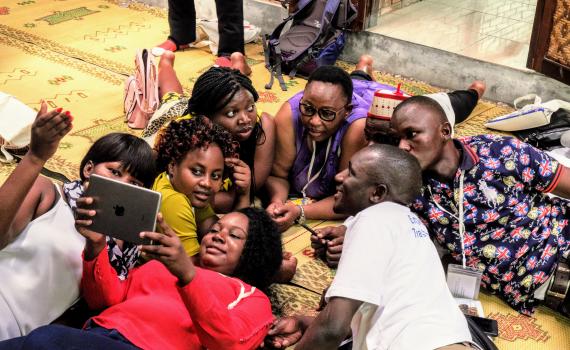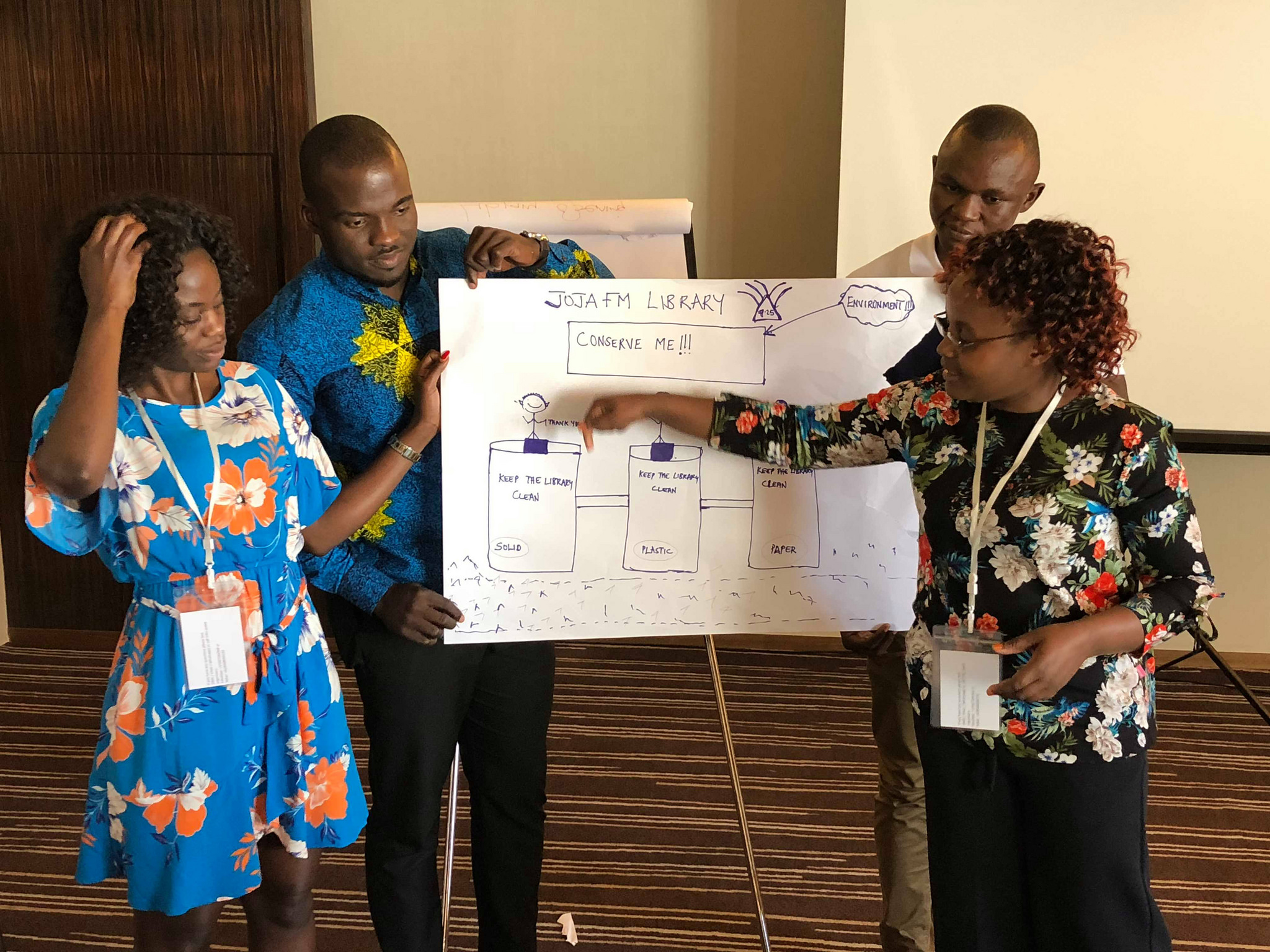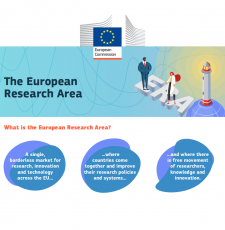
In August, 15 young African public librarians travelled to Southeast Asia (Indonesia and Malaysia) to take part in an intensive learning, knowledge-sharing and networking experience organized by EIFL and partners. The 15 were participants in the Initiative for Young African Library Innovators (IYALI). After their journey, we asked them to reflect on the experience, and how they might apply what they learnt in their libraries back home.
The 15 young African library innovators touched down in Indonesia bringing with them dreams and visions for their libraries. When they took off again at the end of a challenging learning experience, they had transformed these into exciting plans for the future.
Learning took place in a multi-lingual, multi-cultural environment. The programme included presentations and demonstrations of public library service innovation; unconference discussions and visits to public and community libraries around Yogyakarta, Indonesia. There were workshops on leadership; impact assessment; advocacy; communications, and - a hit with all participants - using social media to connect with library users and inform stakeholders. The librarians also took part in a global library conference in Malaysia. And in between, there was a bit of time for sightseeing in two great cities in Southeast Asia - Yogyakarta and Kuala Lumpur.
There was a lot to take in on the 14-day journey, they were exhausted, but somehow, they managed. IYALI 2018 was a transformative experience for the young African librarians, shifting their perspectives about the role of public libraries, librarianship as a profession, and their own work as librarians. It gave them greater confidence and the energy and the skills needed for leading change in their libraries.
“I definitely want to shift my library from being a traditional book lending library to a community engaging library, a library that is in touch with the needs of the community and helps meet the community’s needs,” said Letshani Ndlovu from Bulawayo Public Library in Zimbabwe.
Joseck Olala, from Nakuru Public Library in Kenya, summed up the mood of participants in his reflection after returning home: “Now I am a change-maker!” he declared.
PREPARED TO CHANGE
The three main areas where the IYALI 2018 participants aim to make changes in their libraries’ operations are services; impact assessment and use of data; advocacy and communications.
Community ICT training, services to promote income generation and comics to stimulate imagination featured strongly in plans for new services.
“The first thing I will do is to introduce ICT skills training at my library for the community. We already have computers in the children’s library, hence we will embark on a coding for kids programme where kids will be taught basic computer coding. The other target group will be the youths,” said Letshani Ndlovu from Zimbabwe.
“I intend to start computer training. My target group is unemployed youth because of the high unemployment rate in Namibia,” said Frieda Haihambo from Tsumeb Public Library in Namibia.
“I wish to make my library a community skills acquisition centre, and also to build a forum where members of the community can discuss and initiate a community development project,” said Ranti Ishola from Oyo State Library Board in Nigeria.
“I am going to initiate an innovation incubation centre in Nakuru Public Library. I will be mentoring job-seekers in areas like Design Thinking, writing business plans, grant proposal writing, leadership skills and collaboration and partnership development,” said Joseck Olala from Kenya.
“I am going to develop the impact assessment tools at my library to measure to what extent the library helps communities,” said Mostafa Mohammad Tuhami Emara, of Misr Public Library-Zaytoun branch, in Cairo, Egypt.
“Data is not needed for records and archives, but for evaluation and improvement in our libraries. Data collection is what I will change in my library,” said Harouna Ahmadou Saliou Yerima, from Garoua Municipal Library in Cameroon.
“Marketing strategy is one thing I would like to change in my library, with help from my fellow librarians of course. I would like to encourage my colleagues to take social media very seriously because as the world is changing in terms of technology,” said Martha Naitsuwe Nampola, from Oshana Regional Library in Namibia.
INSPIRING HANDS-ON LEARNING
An innovative service workshop that stimulated interest was on creating comics in the library. The presenter was Tomas Januškevičius, who conducts comic drawing sessions, using tablet computers or pens and paper, in Siauliai Public Library in Lithuania.
“Everybody loves comics regardless of their age. I was surprised that creating comics could be taught so easily. We can use them for children and even young adults who come to our library,” said Jacobson. “Comics are a productive way of engaging children in the library, as well as building their creative writing, and drawing skills,” said Ranti Ishola from Nigeria.
There were presentations by fellow librarians from Africa - Nyasha Sithole from Masiphumelele Public Library in Cape Town, South Africa, shared experiences of teaching vulnerable youth how to use ICT; Mary Kinyanjui of Kibera Public Library, Kenya, spoke about her library’s tablet computer education game for slum children.
Hannes Hasenpatt of Goethe Institut Indonesia did an interactive demonstration of a cultural game application created for young Indonesians, and stimulated discussion about how to introduce gaming programmes using minimal resources.
During a demonstration of ‘Travel Writing’ - a programme run at the community learning centre and library ‘Rumah Dunia’ in Serang by Indonesian travel writer Gola Gong - participants became students themselves, and practised writing up an experience of tasting local pastry, bought from a street vendor across the street from the workshop venue.
INDONESIAN PUBLIC LIBRARIES IN ACTION
A visit to Mata Aksara Community Library, a powerhouse in its community, was an eye-opener. To support income generation in the community, the library provides demonstrations and training on fish farming, composting and vegetable growing. Popular services include chess classes for children, reading, storytelling, and meetings at which women share knitting and sewing sk
ills. During school holidays, there are educational programmes and games, often led by older students, to improve children’s science, writing and creative abilities.
“Mata Aksara library has taught me new roles that libraries can play in our lives. The time has come for Ndola City Council Public Library to go beyond being just a place for reading,” said Pezo Given Kajimalwendo from Ndola Public Library in Zambia. “It was not so much the services as the spirit and participation of the community that inspired me,” said Mostafa Tuhami from Egypt.
At Wukirsari Village Library the IYALI participants heard about training in the library to reduce the impact of disasters, like earthquakes, which are fairly frequent in Indonesia. The library offers ICT training, and teaches advanced students digital design so that they can create and sell designs to earn money. “I was inspired by the ICT and design training programmes. It would be easy to implement them in my community as we already have computers,” said Letshani Ndlovu from Zimbabwe.
Wukirsari Village Library works with 24 partners and eight other libraries. Koi Kazungu from Kwale Community Library in Kenya, noted how these networks contribute to success of the library, and extend its reach and impact: “We may not be able to go far as libraries on our own, but partnerships will help us serve communities beyond our reach,” he said.
At Yogyakarta City Library, African and Indonesian librarians engaged in unconference discussions that also contributed to new learnings:
“Yogyakarta City Library has given me a new view of a public library layout. Each part of the library has its own name!” said Harouna Ahmadou Saliou Yerima from Cameroon.
“An inspiring idea I got was the Book Box I saw at the Yogyakarta City Library. The Box was just at the entrance of the reading room with an inscription that tells visitors to donate a book to the library. I want to implement the Book Box in some of our branch libraries that don’t have enough books for their readers,” said Jacobson Cudjoe, from the Ghana Library Authority in Accra.
GLOBAL NETWORKING OPPORTUNITY
From Indonesia, the group travelled to Malaysia to take part in the 2018 International Federation of Library Associations and Institutions (IFLA) World Library Information Congress (WLIC). There, they met and established contacts with library leaders and librarians from across the world, significantly extending their professional networks. The opening message of the congress, delivered by IFLA President Glòria Pérez-Salmerón, echoed what the IYALI group had learnt in Indonesia: “A transformed society needs transformed libraries that are led by transformed librarians.”
The group enjoyed the opportunity to share information about their libraries through their popular IYALI 2018 poster exhibition: “This was a unique opportunity. We had African librarians telling stories about innovative activities being done in African libraries. Many participants visited our exhibition and commented positively about our programmes,” said Joseck Olala from Kenya.
“Interacting with librarians from around the world at the poster session boosted my confidence level,” commented Jacobson Cudjoe from Ghana, who confessed to feeling anxious about public speaking and doing presentations.
Momoh Mansaray, from Kambia district library in Sierra Leone, was inspired by the power and potential of networking: “Meeting committed librarians from all over the world changed my whole perception as a librarian. I am now quite zealous about networking, and will continue to network,” he said.
“The IYALI programme on the whole was a kind of eye-opener to me and for my library especially,” added Momoh.
FIND OUT MORE
Meet the IYALI 2018 participants, who came from 12 countries - Cameroon, Egypt, Ghana, Kenya, Namibia, Nigeria, Sierra Leone, South Africa, Tanzania, Uganda, Zambia and Zimbabwe.
See the full IYALI 2018 programme here.
IYALI is organized by EIFL in partnership with the African Library and Information Associations and Institutions (AFLIA) and IFLA. Find out more here.
This is the second group of IYALI participants. In 2017, the first group of 13 young African library innovators took part in a learning experience in Lithuania and Poland. Read what they said about the experience here.
See photos of the IYALI participants and the learning experience.
SHARE / PRINT








